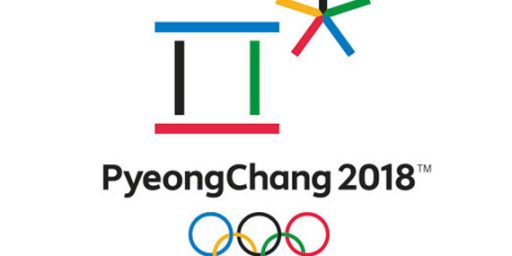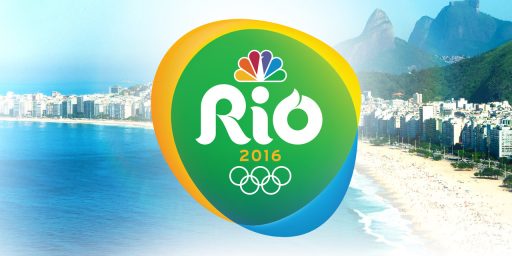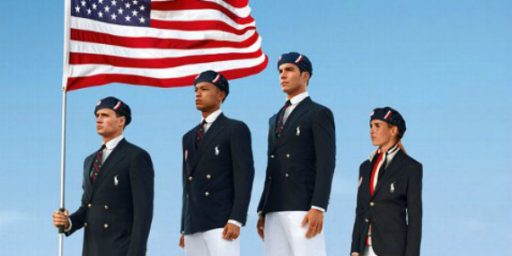Social Network Dedicated To Knitting Runs Up Against The U.S. Olympic Committee
Sometimes, the law can be an ass.
You’ve probably never heard of a social network called Ravelry, mostly because unlike other social networks its not open to the public. More importantly, though, it’s dedicated to specified topic because it’s a social network for people interested in knitting, sewing, and related crafts. You can guess that the demographics of this site are far different from what you’d find on Facebook and Twitter, and you’d think that a bunch of (mostly) ladies who knit probably aren’t going to get in too much trouble. Well, you’d be wrong on that last point, because they’ve gotten themselves into a dispute with the United States Olympic Committee:
If you mess with the Olympics trademark, a cloud of legal hurt will descend on you faster than Tyson Gay in the Men’s 100 meters. Case in point: The U.S. Olympic Committee has sent a cease and desist letter to a knitting-based social network for hosting a knitting “olympics.” Now, knitters are in revolt.
2012 was to be the third year that the knitting social network Ravelry—yes, this exists and is surprisingly popular—hosted a “Ravelympics,” a knitting competition for users that includes events like an “afghan marathon,” and “scarf hockey.” Knitters were supposed to compete in their events while watching the actual Games on TV.
But that was before the U.S. Olympics Committee got wind of it and sent Ravelry a cease & desist, for making a mockery of the Games with their needlework.
It’s worth taking a look at a portion the cease and desist letter itself, because it points out just how powerful the Intellectual Property laws are:
Dear Mr. Forbes,
In March 14, 2011, my colleague, Carol Gross, corresponded with your attorney, Craig Selmach [sic], in regard to a pin listed as the “2010 Ravelympic Badge of Glory.” At that time, she explained that the use of RAVELYMPIC infringed upon the USOC’s intellectual property rights, and you kindly removed the pin from the website. I was hoping to close our file on this matter, but upon further review of your website, I found more infringing content.
By way of review, the USOC is a non-profit corporation chartered by Congress to coordinate, promote and govern all international amateur athletic activities in the United States. The USOC therefore is responsible for training, entering and underwriting U.S. Teams in the Olympic Games. Unlike the National Olympic Committees of many other countries, the USOC does not rely on federal funding to support all of its efforts. Therefore, in order to fulfill our responsibilities without the need for federal funding, Congress granted the USOC the exclusive right to use and control the commercial use of the word OLYMPIC a and any simulation or combination thereof in the United States, as well as the OLYMPIC SYMBOL. See the Olympic and Amateur Sports Act, 36 U.S.C. §220501 et seq. (the “Act”). (A copy of the relevant portion of the Act is enclosed for your convenience.) The Act prohibits the unauthorized use of the Olympic Symbol or the mark OLYMPIC and derivations thereof for any commercial purpose or for any competition, such as the one organized through your website. See 36 U.S.C. §220506(c). The USOC primarily relies on legitimate sponsorship fees and licensing revenues to support U.S. Olympic athletes and finance this country’s participation in the Olympic Games. Other companies, like Nike and Ralph Lauren, have paid substantial sums for the right to use Olympic-related marks, and through their sponsorships support the U.S. Olympic Team. Therefore, it is important that we restrict the use of Olympic marks and protect the rights of companies who financially support Team USA.
In addition to the protections of the Act discussed above, the USOC also owns numerous trademark registration that include the mark OLYMPIC. These marks therefore are protected under the Lanham Act, 15 U.S.C. §1051 et seq. Thus, Ravelry.com’s unauthorized use of the mark OLYMPIC or derivations thereof, such as RAVELYMPICS, may constitute trademark infringement, unfair competition and dilution of our famous trademarks.
Perhaps the silliest part of the letter, though, is this:
The athletes of Team USA have usually spent the better part of their entire lives training for the opportunity to compete at the Olympic Games and represent their country in a sport that means everything to them. For many, the Olympics represent the pinnacle of their sporting career. Over more than a century, the Olympic Games have brought athletes around the world together to compete at the Olympic Games and represent their country in a sport that means everything to them.
[…]
We believe using the name “Ravelympics” for a competition that involves an afghan marathon, scarf hockey and sweater triathlon, among others, tends to denigrate the true nature of the Olympic Games. In a sense, it is disrespectful to our country’s finest athletes and fails to recognize or appreciate their hard work.
The author of the letter is completely correct on the basics of the law. In 1978, Congress passed the Amateur Sports Act which, in addition to setting up the U.S. Olympic Committee as a quasi-government organization, gave the USOC exclusive rights over certain trademarks associated with the Olympics and the other games that the USOC is associated with, such as the Paralympics and the Pan-American Games. To quote the statute:
(a) Exclusive Right of Corporation.— Except as provided in subsection (d) of this section, the corporation has the exclusive right to use—
(1) the name “United States Olympic Committee”;
(2) the symbol of the International Olympic Committee, consisting of 5 interlocking rings, the symbol of the International Paralympic Committee, consisting of 3 TaiGeuks, or the symbol of the Pan-American Sports Organization, consisting of a torch surrounded by concentric rings;
(3) the emblem of the corporation, consisting of an escutcheon having a blue chief and vertically extending red and white bars on the base with 5 interlocking rings displayed on the chief; and
(4) the words “Olympic”, “Olympiad”, “Citius Altius Fortius”, “Paralympic”, “Paralympiad”, “Pan-American”, “America Espirito Sport Fraternite”, or any combination of those words.
As you might imagine, the USOC has been quite aggressive in protecting its exclusive rights to the names and symbols listed in the statute. Most famously, this included a case that made it all the way to the Supreme Court in 1987 called San Francisco Arts & Athletic Corporation v. United States Olympic Committee. In that case the USOC was suing over an event called the “Gay Olympics,” which was, as you’d imagine, an athletic competition featuring gays and lesbians. In the end, the Supreme Court sided with the USOC 7-2 and the majority opinion broadly interpreted the grant of exclusive use that had been granted in the act, at one point stating “legislative history demonstrates that Congress intended to provide the USOC with exclusive control of the use of the word ‘Olympic’ without regard to whether an unauthorized use of the word tends to cause confusion.”
With the blessing of the Supreme Court 25 years ago, the USOC has been utterly relentless in pouncing on any other organizations who attempted to use the word Olympics, or any variation thereon, in connection with an event or undertaking, no matter how unlikely it was that anyone would actually be confused by the similar names. As this Wall Street Journal article notes, they have gone after everything from the Rat Olympics to the RobOlympics (for robots) to the Petlympics (an event featuring dogs and other house pets). In most cases, of course, merely sending a cease and desist letter is sufficient for the USOC to get what it wants because most of these organizations don’t have the resources to fight an organization like the USOC which keeps lawyers who charge hundreds of dollars per hour on retainer precisely for these types of cases. Moreover, given the state of the law, it seems fairly clear that the USOC has pretty air tight cases in each of these situations, and it’s going to be very difficult to find a Federal Judge willing to rule against a corporation that has been granted exclusive use rights in its own piece of legislation. When you add in the fact that the statute in question allows the USOC to recover its attorneys fees if it has to go to court against a violator, and there’s almost no situation where it makes sense to fight one of these cease and desist letters even for the principle of the matter.
All the same, the USOC now finds itself up against a bunch of angry knitters:
The online knitting community is in uproar: “2 Million Knitters with Pointy Sticks are Angry at the US Olympic Committee,” wrote knitting blogger Exchanging Fire.
Some took exception to the idea that knitting is a less noble pursuit than table tennis: “I don’t think it takes nearly as much effort to knit a sweater than it does to be picked for the Olympics but that doesn’t mean that sweater knitting (or whatever) isn’t as impressive,” wrote Vanessa, of the blog Mixed Martial Arts and Crafts.
Here are one of the hundreds of tweets from Ravelry’s 2 million users, from Clara Parkes: ”Oh no they didn’t: @USOlympic just suggested that knitting ‘denigrates’ Olympic brand. The 1 in 3 Americans who knit just got really angry.”
The USOC is demanding Ravelry change the name to the “Ravelry Games,” but we say: Why not make knitting an Olympic sport instead? Pair up knitting a baby sweater with target shooting and make it the summer version of the biathlon. Those would be some Nike ads.
Ironically, as Jazz Shaw points out, there was a time when knitting was an Olympic event. More broadly, it strikes me that the USOC is being pretty short sighted here. I can see why they’d be concerned about rival sporting events (even for non-humans) that use their name but all this is a bunch of ladies who watch the Olympics, knit, and share their work online. What is so darn threatening about that? I understand that failing to enforce a right can sometimes be considered a waiver, but there’s ways to deal with that problem that would allow Ravelry to hold its event while not damaging the legal rights of the USOC. Why they can’t do something like that, I don’t quite understand. More importantly, I’m not sure why some lawyer at the USOC decided it was a good idea to send a threatening letter to a bunch of knitters. Surely, there are greater threats to their business interests out there?







Ravelry should have an event wherein participants collectively knit a huge banner with the five circle olympic logo and the slogan, “the USOC socs!
@Doug Mataconis:
Because they are a**holes.
Charlie Brooker is still the “Sole Official UK Tweeter of the 2012 Olympic Games” though….
Trademarking generic words has always been my hot button. See also “Windows(TM).” I would have been fine with “MS-Windows(TM)” or any variant.
Given the age of the word in question .. IMO no defense.
@john personna: .
Except it’s worth pointing out that this isn’t a Trademark issue, this is a separate Federal Law that gives the USOC exclusivity over certain words and symbols. If the USOC had tried to trademark “Olympics” they probably would’ve been turned down for the reasons you state.
@Doug Mataconis:
Then why does your article mention Trademark as much as it does?
@john personna:
I was using the term in its generic sense because there’s really no other word to describe what the USOC has. That’s why I didn’t capitalized the word. And I’m pretty sure I only actually used it once
@Doug Mataconis:
And the bits you quoted?
That says “trademark registration” pretty clearly, doesn’t it?
Fair point, but its overall rights originate in the ASA.
This is the part that really makes me want to slap someone:
The jackass that wrote that paragraph makes (at least) a 6-figure salary from USOC. “The athletes of Team USA” don’t make jack. It’s not just the lack of a compelling US-vs-USSR kind of rivalry – it’s the level of sheer mercenary BS that the Olympics has devolved into (not just the USOC, but all of it) that really makes me not give a rat’s ass about the Games anymore.
I remember a restaurant that was named the “Olympic” and was shut down. This happened years ago. Many schools around here have spring “field days” and some call them “Mini Olympics”. I guess that is out now.
Given the intensity of the threat and the damages they can claim, I’m not sure why you haven’t added “the word that shall not be used” to your spam filter to protect OTB.
After reading this, I’m not sure I want to watch “the games that shall not be uttered” for fear of falling afoul of their wrath.
Yet another story that hints at why being connected to the Olympics isn’t going to be a positive.
Somewhere in this post you should have referred to “knit wits”.
I’m a Ravelry member and have been so since 2007. I’m also an attorney. I get that the USOC must vigorously defend its intellectual property, but attacking the Ravelympics (or should that be Ravel:::censored:::ics?) was going just a bit too far.
And no, we’re not changing it to “The Ravelry Games.” Mostly because the hapless summer intern (for such he is) who sent the C&D letter suggested it. But I do have a mental image of USOC legal department staffers thrown into an arena, armed only with knitting needles and yarn, required to wage an epic battle to the death while Ravelers munch popcorn and watch (and knit).
@SmokeFan14: “…or should that be Ravel:::censored:::ics?”
I like it! Ask their intern if changing the name to that will settle the complaint. (My guess would be “no,” so there’s no telling how deep the pool of mendacious idiocy runs here.)
Trump ™. I live in Las Vegas, so don’t get me started about how casinos have to call the football game that takes place on the first Sunday of February “The Big Game”.
the correct quote is “the law is a ass”
The talk of trademark and IP reminds me of a quip: “I’d wish Harlan Ellison a happy birthday, but I don’t have the money for a lawyer.”
The intention of the Ravelympics has never been to be a separate event from the actual Olympics. It was just a group of knitters and crocheters who wanted to have a bit of fun together while they watched the Olympics.
Where the USOC’s standard C&D went wrong was by lumping the C&D with a handful of DMCA takedown notices, and stirring in some condescension and rudeness. I was following the original thread on Ravelry, after a copy of the letter was posted, and most of the people were quite understanding about changing the name of the event. The comment in the letter that mentioned ‘denigrating’ the Olympics is what set everyone off.
While it’s certainly not Facebook, I think that people fail to realize the scope of Ravelry. There are currently 2.2 million registered users. Of those, 440,000 logged into the site within the last week. That is a lot of people with a common interest and a common cause. Rallied together, that’s a fair amount of power, as the USOC is still finding out.
@legion: Actually, a lot of Olympic athletes make handsome incomes from sponsorships, endorsements, appearance fees, and the like. It’s been 20 years or more since the Olympics were an amateur event.
@James Joyner: Some certainly do, but I would argue strongly with the term “a lot”. It’s like saying saying a lot of kids who start for their High School basketball teams will get NBA championship rings – the numbers just don’t agree. Just competing in the Olympics might make you famous in your home town, but unless you’re one of the few who win multiple golds, set world records, or have a particularly compelling storyline, you’re not going to get asked to endorse anything bigger than a store opening. I’ve seen estimates ranging from 10,500 to 17,000 for the number of individual athletes expected to compete just in the 2012 Summer Games. How many can you name?
Thank you for one of the more intelligent articles on this whole debacle.
I’ve been a member of Ravelry since 2007, and have participated in the Ravelympics in the past. Unlike many of the other situations (Ferret Olympics, for example) ours is actually all about supporting the actual Games; many of us aren’t into sports, and might not even watch them. But the idea is to set a goal (knitting one’s first sweater, for example) which we know will be a challenge, and complete that project within the time limit of the Games. We may not begin before the Opening Ceremonies, and must finish by the Closing Ceremonies, and the idea is to watch the Games while knitting (or whatever chosen fiber craft one does, crochet, weaving, etc.).
So this honors the actual Olympics.
I understand about protecting their ‘property’ – we get that. And obviously, no one should be profiting from this. But as you say, this is no threat to them! No one is going to say, oh, I’m not going to watch the Olympics this year – I’m going online to the Ravelympics instead. (Well, they are now… but that’s the USOC’s fault.) But we aren’t in competition with them. We aren’t detracting from the brand.
And it’s not like Coca-Cola (TM) is going to withdraw sponsorship of the Games because they choose to sponsor the Ravelympics instead!! So what is their issue?
I’m stumped.